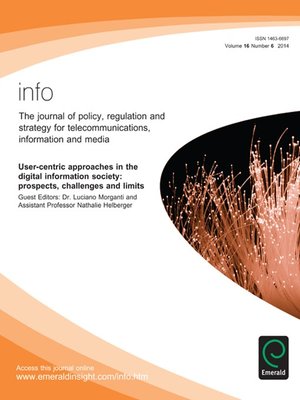Info: The Journal of Policy, Regulation and Strategy for Telecommunications, Information and Media, Volume 16, Issue 6
ebook ∣ User-Centric Approaches in the Digital Information Society: Prospects, Challenges and Limits · Info: The Journal of Policy, Regulation and Strategy for Telecommunications, Information and Media
By Luciano Morganti

Sign up to save your library
With an OverDrive account, you can save your favorite libraries for at-a-glance information about availability. Find out more about OverDrive accounts.
Find this title in Libby, the library reading app by OverDrive.



Search for a digital library with this title
Title found at these libraries:
| Library Name | Distance |
|---|---|
| Loading... |
This brief introduction should prepare the ground for an understanding of the importance of the topic at the 2014 EuroCPR conference. The variety and the relevance of the many contributions the public had the opportunity to listen to and discuss at the conference has been interpreted as a clear sign of the timeliness of the topic and its importance.
After a blind peer-review, a total of six papers were selected for inclusion in this ebook. The selection was not an easy one as all submitted papers reflected on and presented various interesting perspectives on the topic of the ebook. Finally, the papers that ended up inthe journal span various disciplines and cover the range of themes discussed at the conference. These selected papers discuss: optimising transparency for users in social networking sites (SNS), user-oriented universal services for the EU information society, digital inclusion and user empowerment and disempowerment, industry and user perspective in digital TV innovation, a user-centric approach in RFID toll/ticketing and, to conclude, capabilities and toolkits in public service delivery for participatory governance. They do so from different angles and perspectives including the legal, economic, political science and/or communication science dimensions as well as the sociological and anthropological ones.
The reader should also notice that the selected papers address, with different styles and emphasis, the initial questions of the conference: examining whether user-centric European information society policies are serving the interests of (European) consumers/citizens (this is the case in the paper by Wauters, Lievens and Donoso); whether the rhetoric of European information society policy is aligned with implementation (the papers by Batura, and by Mariën and Prodnik); how user-centric policies can better inform market practice and policy making (the paper by Jennes and van den Broek); and, finally, understanding what the contribution of users to our information society/economy is and how this could be integrated into research, business decisions, policy making—especially in multi-stakeholder approaches (the papers by Storm-Mathisen, and by van der Graaf and Veeckman).







